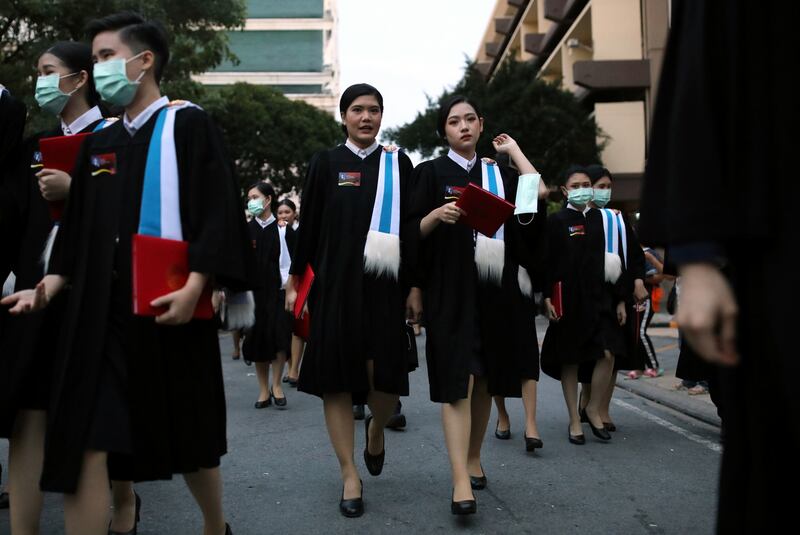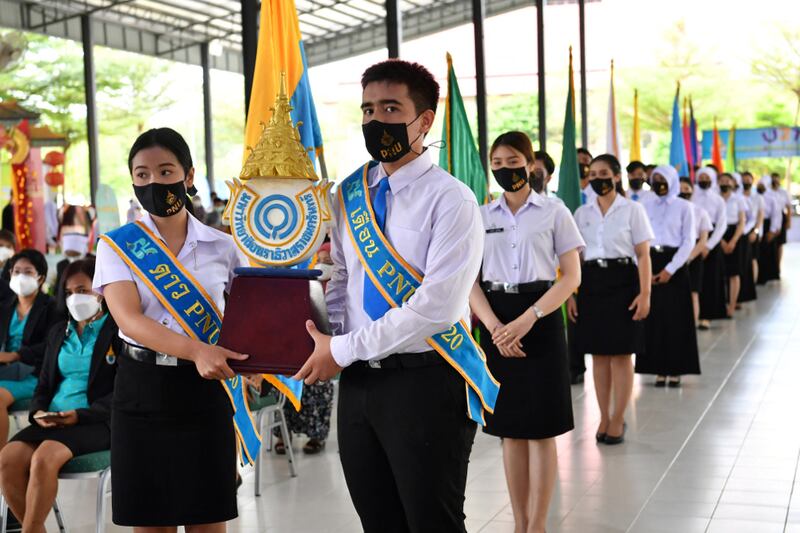Thai academics are concerned that Chinese nationals have taken majority stakes in three private universities because they fear these overseas investors could focus on profit over the quality of education.
Academics in Thailand also worry that these institutions could prioritize the recruitment of Chinese students over local ones and international programs over courses focused on local needs.
Some Thai students at these universities, though, said they have not seen drastic modifications to curricula or courses, yet, since the Chinese investors have come on board. They noted that the only changes they have seen are more Chinese students, and, in some cases, more international programs.
Supachai Pathumnakul, deputy permanent-secretary of the Ministry of Education Science, Research and Innovation, downplayed concerns saying private universities were rigorously regulated.
He said the three universities with Chinese investments, Krirk University, Metharath University and Stamford International University, “have undergone structural modifications involving foreign shareholders to have Chinese as executives and university council members.”
“Regardless of how the university’s structure or management evolves, they are strictly regulated under Thailand’s Private University Act, the Higher Education, Science, Research and Innovation Act and other laws related to private higher education institutions in Thailand,” he told BenarNews.
“This issue is also overseen by the Office of the Higher Education Commission, the Commission on Higher Education Standards and the Ministry of Education,” he said.
He said that under Thai law, while the president of the university council and the academic leader of the university can be foreigners, at least half of the council members must be Thai citizens.
But how did Chinese investors get involved with Thai universities?
At one university, declining enrolments was the reason.
Krirk University Rector Krasae Chanawong said the number of students fell to less than 2,000 four years ago from its top enrollment of 3,000, leading it to bring on a Chinese investor to shore up funds.
Both the Krirk council president and the university president are Thai, while about 17% of the council members are Chinese.
Krirk currently has a little over 1,000 students on its rolls, according to the National Statistical Office.
Elsewhere, Stamford International University, with 600 students, has a Chinese council president and a Thai dean, with about 40% Chinese council members.
Hong Kong-listed China YuHua Education Investment Limited (YuHua) acquired the university from the U.S.-based Laureate Education in 2019, according to Thailand’s Royal Coast Review.
Faith Star (Thailand) Co. Ltd., whose executive directors and shareholders are almost entirely Chinese, owns 51% of Metharath University, which used to be called Shinawatra University.
Metharath University’s council president and dean are both Chinese, as are about 40% of the council members.

Concerns
Aside from ownership issues, academics are worried about scholarship and access issues.
Philairat Sriwichianaumphai, a lecturer at the Faculty of Interdisciplinary Studies at the Christian University of Thailand, said the Chinese business model tends to aid managerial efficiency.
“Increasing Chinese capital investment in universities brings about managerial concerns that profit will be the biggest goal. These universities may focus heavily on business aspects while ignoring educational quality,” Philairat told BenarNews.
“Another issue is that they may limit the number of Thai students since the university can only take a limited number of students, they may focus more on recruiting more Chinese.”
Isa Gharti, an analyst at Chiang Mai University, noted that Thai universities have recently moved to accept more foreign students.
“A few Chinese students have issues with their English language test results. However, I am unsure about private universities – are there any screening procedures in place to ensure that Chinese students meet standards before enrolling?”
“Universities are making a deliberate effort to open international programs for Chinese students. Public universities have a standard selection process,” Isa told BenarNews.
Nationally, Thai universities reported seeing more Chinese students in their classrooms, according to figures released as of 2020 before the COVID-19 pandemic.
About 14,423 Chinese students were enrolled in 2020, compared to 11,993 in 2019 and 10,617 in 2018, according to data from the Ministry of Education, which did not provide figures for the last two years.
“Since the Chinese government announced the opening of the country, I expect that many more Chinese students will come to study in Thailand,” Supachai said.

Curriculum changes?
Some Thai students BenarNews spoke to at the universities with Chinese investors said they didn’t notice changes in the curricula.
“The university hasn’t made any clear announcement and I do not think it will affect the curriculum. The lecturers and classes remain unchanged,” said Choktawi, a graduate student at Krirk University, whose last name was withheld over the student’s privacy concerns.
“I barely see any difference, except an increased number of Chinese students. That’s all I know.”
An undergraduate student at the same university said there appear to be more Chinese students on the Bangkok campus.
“I knew that a Chinese businessman bought shares or something like that, but I don’t think it will impact the university. There are already a big number of foreign students and more Chinese students as well,” said Prapat, whose last name was also withheld for privacy reasons.
A Metharath student said the change in ownership could be one reason for the university changing its name from Shinawatra University.
The university was founded in 1999 by billionaire Thaksin Shinawatra, who was ousted from the prime minister’s office in a military coup in 2006 and has been living in self-imposed exile.
“The university website now has Chinese language and more courses have been added for international students,” student Napatsorn said. “More exchange programs in foreign countries are available.”
Napatsorn, who asked to be identified by first name only, said the Chinese students’ English skills are on a par or lower than that of Thai students.
“Students from India have incredible English skills, compared to Chinese students,” Napatsorn said.
“Their [Chinese students’] English skills are not very different from Thai students. Some are even less fluent than Thai students in my friends’ circle.”
As for why Chinese students chose to study in Thailand, Kulnaree Nukitrangsan, a researcher at the Institute of Asian Studies at Chulalongkorn University, cited two reasons.
She said some choose to study internationally because they are unable to pass admission exams in China, while others seek to leave the country’s competitive society and excessive pressure.
Thailand is chosen as an educational destination because “the cost is not high and the curriculum is diverse and flexible, making it affordable for middle-class families. Thailand suits the needs of Chinese students,” she said.
Lee Wei Yi, a Chinese graduate student at Chiang Mai University, told BenarNews that there are many reasons other than educational opportunities for Chinese people to study in Thailand.
“To put it bluntly, there are Chinese people who are genuinely interested in education,” Lee said.
“However, some people come to study to obtain a visa to travel for an extended period of time.”
Researcher Mary Zhao at Radio Free Asia, a news service affiliated with BenarNews, contributed to this report.
